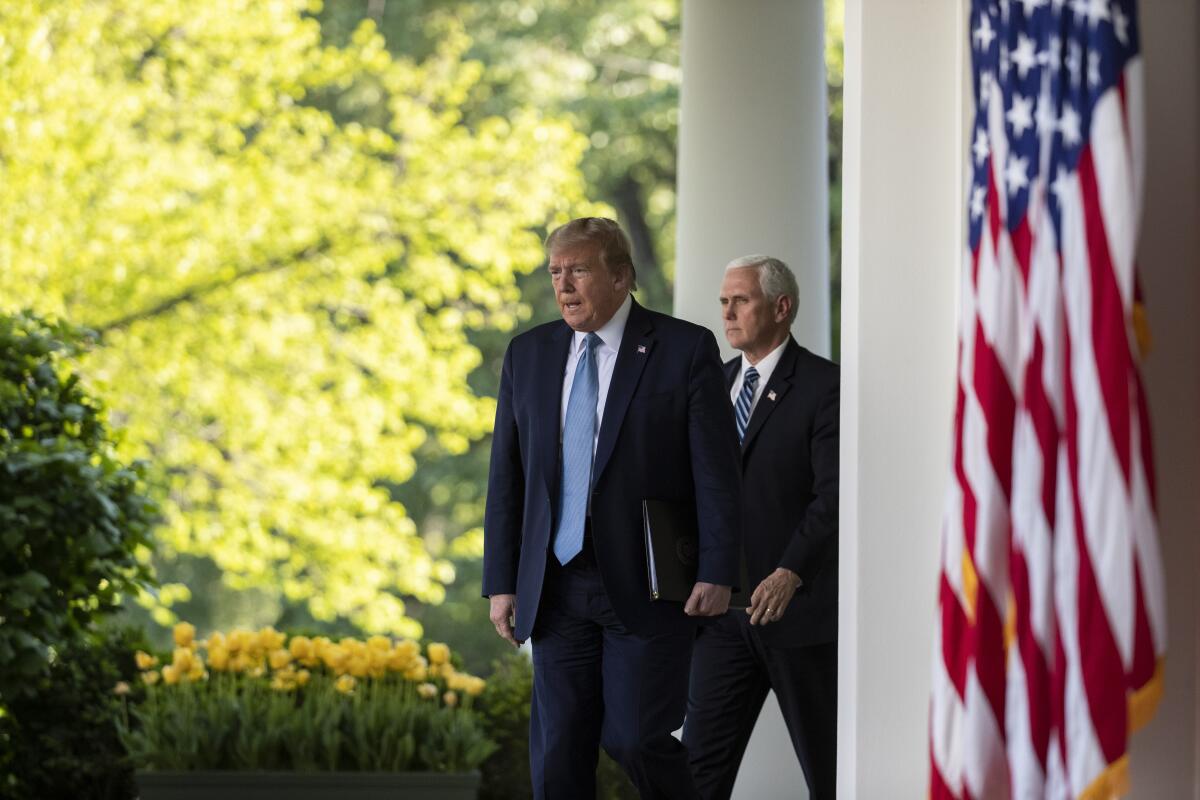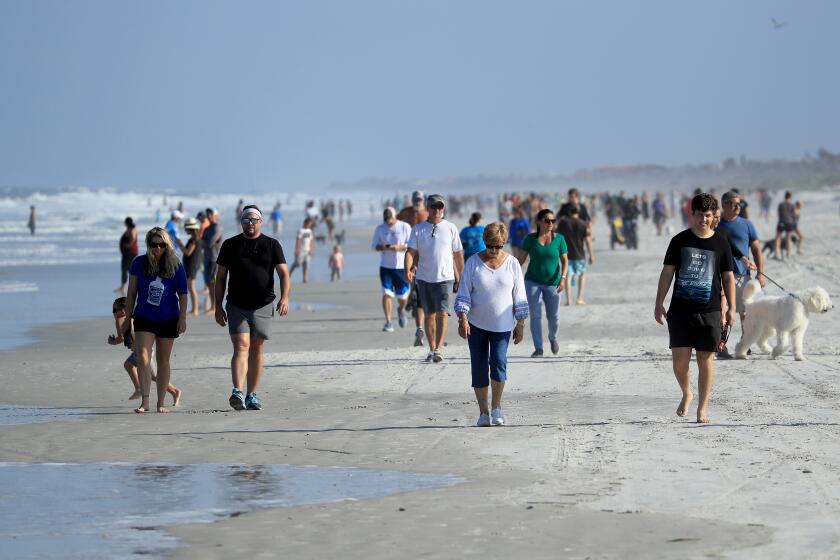Does Trump have ‘total authority’ during the coronavirus outbreak, or any other time?

- Share via
President Trump has given constitutional scholars a lot to discuss this week.
During a news conference on the coronavirus outbreak Monday, he said that by virtue of his position, he “calls the shots,” that his “authority is total” and that states “can’t do anything without the approval of the president.”
A day later, Trump said he wouldn’t pressure states to reopen, but would “be authorizing” governors to ease restrictions when they see fit. But, he added: “If some governor has a lot of problems, a lot of cases, a lot of death, and they want to open early, we’re not going to let it happen.”
Wednesday, he said “we can do whatever we want.” Friday, he tweeted “LIBERATE MICHIGAN!” — and Minnesota and Virginia.
Trump has also threatened to adjourn Congress so he could make recess appointments to fill vacancies in his administration.
Meanwhile, governors on the West Coast, the East Coast and in the Midwest banded together to coordinate plans for reopening their states when they deem it safe to do so.
Legal experts say that although the president does receive certain powers through laws related to emergency situations, he’s restricted to the tools given to him by Congress, which has its own limits.
“The first question is, can the federal government, in general, do that? And the next question is, can the president do that?” said Kathleen Bergin, a professor at Cornell Law School who specializes in disaster law and has taught constitutional law. “Because it might be that Congress can do it, but the president can’t, or vice versa.”
Here’s a breakdown of what the president, Congress and governors can do under the Constitution:
Is the authority of the president ‘total’?
In a word, no.
The president has argued that Article II of the Constitution allows him, as president, “to do whatever I want,” as he said during a June 2019 ABC News interview. Article II, the section of the Constitution that outlines the powers and responsibilities of the president, does not grant unlimited power.
Florida and Texas ease coronavirus restrictions after pressure from Trump, who insults New York Gov. Andrew Cuomo and defends protesters defying social distancing rules.
Laws such as the Stafford Act, the National Emergencies Act and the Defense Production Act do grant the president added powers in a crisis, but the source of that authority is legislation passed by Congress.
“A common misconception is that the president does have extensive power in an emergency,” Bergin said. “That’s true, but it’s still confined by the limits of the Constitution.”
During the Korean War, when President Truman tried to temporarily nationalize the nation’s steel mills through an executive order after workers went on strike, the Supreme Court ruled against him, arguing that neither Congress nor the Constitution gave him the authority to issue the order.
“In the framework of our Constitution, the President’s power to see that the laws are faithfully executed refutes the idea that he is to be a lawmaker,” Justice Hugo Black wrote in the majority opinion. “The Constitution limits his functions in the lawmaking process to the recommending of laws he thinks wise and the vetoing of laws he thinks bad.”
What rights do states and governors have?
The Constitution clearly outlines the powers of the states, as several members of Congress have noted.
Protecting the welfare of residents from the coronavirus outbreak by closing nonessential businesses and limited public gatherings falls under the states’ police power under the 10th Amendment.
“In our system, the states are independent governments,” said Robert Chesney, a professor at the University of Texas at Austin School of Law. “And though it is true that federal law is supreme over any contrary state law, the president doesn’t make federal law. That’s Congress’ job, and Congress has not given the president any authority to do what he’s talking about in this instance.”
What can the federal government do to reopen the states?
Congress can’t order states to reopen schools or businesses, Bergin said.
It’s more likely that governors loyal to the president will follow his lead on when to reopen. Even then, governors in both parties have expressed resistance to the federal government dictating when stay-at-home orders lift.
Under growing criticism for his administration’s laggard response to the coronavirus, President Trump has upped his efforts to blame others — including the WHO, Dr. Anthony Fauci, China, governors and the media.
“We’d love to have the president’s cooperation,” Republican Maryland Gov. Larry Hogan said during a CNN interview this week. “But governors made decisions to take various actions in their states based on what they thought was right for their state, based on the facts on the ground, talking with doctors and scientists. And I think individual governors who made those decisions will have the ultimate decision about what to do with their states.”
Can the president adjourn Congress?
Article II states that the president may adjourn both chambers of Congress if they disagree on a time to adjourn.
But that is not the case right now.
The House and Senate have agreed on a date: Jan. 3, 2021. And though the chambers are in recess, they have continued to meet in “pro forma” sessions — brief meetings where a member gavels in but business usually isn’t conducted — to prevent them from being in recess for more than three days.
The president called this practice a “dereliction of duty” that was preventing him from filling key government positions.
The Senate can only adjourn for more than three days with permission from the House, and vice versa. (The Supreme Court has ruled that the Senate must be in recess for at least 10 days before a president can make a recess appointment.)
“The Senate should either fulfill its duty and vote on my nominees, or it should formally adjourn so that I can make recess appointments,” Trump said Wednesday. “If the House will not agree to that adjournment, I will exercise my constitutional authority to adjourn both chambers of Congress.”
No president has ever exercised this power, but if Senate Majority Leader Mitch McConnell summoned the Senate back to Washington and that Republican-controlled chamber voted to adjourn and the Democratic-led House disagreed, then the president would be within his rights to adjourn Congress.
The odds of the Senate adjourning in the middle of a pandemic and economic crisis are slim, to say the least.
“That would be so politically damaging,” said Elizabeth Goitein, the co-director of the Brennan Center for Justice’s Liberty & National Security Program. “It’s just not even possible to imagine that happening.”
McConnell’s office appeared to rule out the possibility without directly referencing the president’s threat. A spokesman for McConnell (R-Ky.) said the majority leader “pledged to find ways to confirm nominees considered mission-critical to the COVID-19 pandemic,” but under Senate rules that requires the consent of Senate Minority Leader Charles E. Schumer (D-N.Y.).
More to Read
Get the L.A. Times Politics newsletter
Deeply reported insights into legislation, politics and policy from Sacramento, Washington and beyond. In your inbox three times per week.
You may occasionally receive promotional content from the Los Angeles Times.












